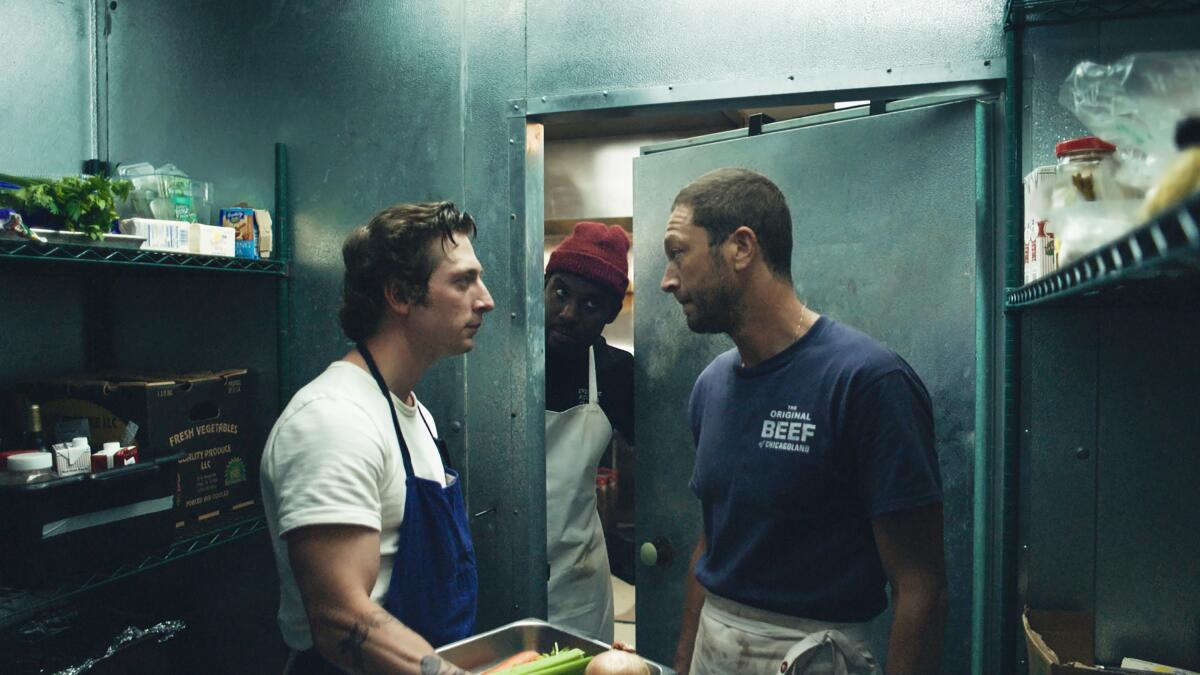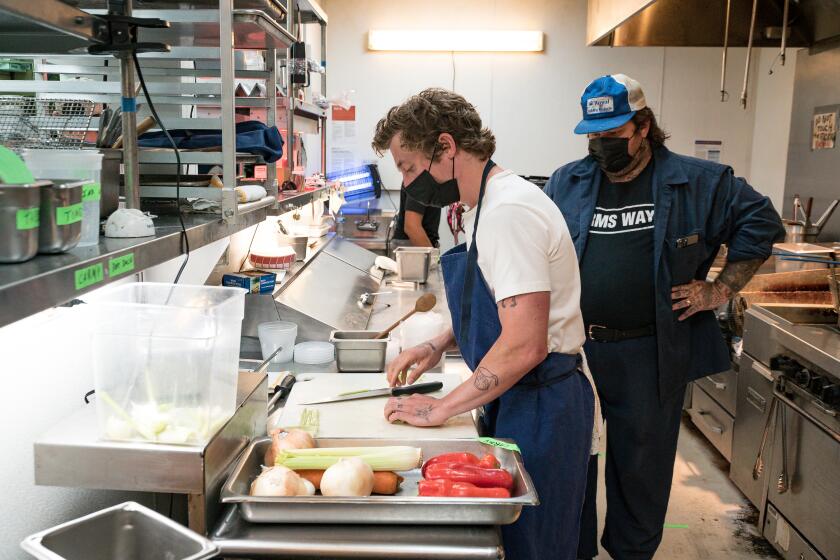You may never get a more extraordinary glimpse inside a restaurant kitchen than this

- Share via
“The Bear,” premiering Thursday on FX, is an extraordinary show, not so much for the story it tells as how it tells it; you will have to go far to find another show so invested in and adept at portraying ordinary human speech and behavior, and even then you might not find one.
The story is this. Jeremy Allen White plays Carmen Berzatto, called Carmy, and sometimes Bear, a talented chef who returns from the world of very fine dining to run a family sandwich shop, the Original Beef of Chicagoland, after the suicide of his brother. He plans to clean up the joint — on his hands and knees where needed — improve the food and professionalize the kitchen, to create “an efficient, respectable place of business, run by adults.”
“I’m going to fix this place,” he tells his sister, Sugar (Abby Elliott), as much out of a sense of mission as a sense of business. (As a business, it makes little sense.) Of course, he is also out to fix himself, whether he knows it or not.
The complete guide to home viewing
Get Screen Gab for everything about the TV shows and streaming movies everyone’s talking about.
You may occasionally receive promotional content from the Los Angeles Times.
And so the cooking staff are henceforth addressed as “chef,” knives are sharpened and new systems put in place. This sits less well with some employees than others, namely Richie (Ebon Moss-Bachrach), an irascible honorary cousin, who runs the front of the house but is often just underfoot, talking loudly; and passive-with-the-emphasis-on-aggressive Tina (Liza Colón-Zayas), who has been working there for years and has her own way of doing things. (She will call Carmy not “chef” but “Jeff,” as if she misheard the instruction.) By contrast, Marcus (Lionel Boyce), who has been baking bread for the sandwiches, is inspired to go beyond himself and sets out on a quest to create the perfect gourmet doughnut.
Into this hectic environment comes Sydney (Ayo Edebiri), hired as a sous chef, a Culinary Institute of America graduate with restaurant experience, a good deal of ambition and an awareness of Carmy’s reputation. Sydney’s sudden leapfrogging of responsibility does nothing to endear her to the original staff, while she hectors Carmy with proposals to which he never responds quickly enough to suit her. Practically speaking, she provides another sort of voice for Carmy to respond to, someone with knowledge of his world, and as the new girl, she asks questions that help define other characters. But the exposition is never obvious.
Created by Chris Storer, who serves as showrunner alongside Joanna Calo, “The Bear,” reduced to its basic structure, is “The Bad News Bears” (a film coincidentally mentioned here), in which a ragtag crew exceeds its own expectations, while the new boss earns himself a measure of redemption. It is delightful to watch these transformations, and, really, they are quite enough: the plot, such as it is, is secondary to the place and to the people. (We do not get much in the way of backstories; what matters is the present.) I could have easily watched twice as many episodes — there are eight — in which nothing happened but that lunch was served.
Most of the action takes place in the restaurant, and most of that in the kitchen. (We rarely see the customers.) I can’t say whether it’s true to how such a place would run, even under a seasoned chef, but it feels right, and White is every inch a trained kitchen professional, moving with athletic ease through the cramped space; it’s where he feels at home. (At home, the chef eats peanut butter and jelly and falls asleep in front of the television.)
At Pasadena’s Institute of Culinary Education and Santa Monica’s Pasjoli, ‘The Bear’s’ Jeremy Allen White sharpened his skills to play a chef.
Carmy has a core of sadness, not unrelated to the death of his brother, and that affects his relationship with his sister — their awkward scenes together are some of the series’ best — but he is happily free of the negative characteristics we have come to associate with fictional (and some notorious nonfictional) chefs: arrogance, unkindness, substance abuse, sexual predation. (White, in a focused performance that feels at once relaxed and tightly wound, makes Carmy ailing but admirable.) He is secure in what he knows and honest with his employees, who do not always appreciate it. He’s not immune to anger — a late episode requires him to blow up, but this felt like the writers making something “dramatic” happen late in the arc, written backward from the desired results — and he’s always ready to apologize. (So, too, the season ends with what is essentially a magic trick — literally a Penn & Teller-type magic trick — that, in spite of having been prepped across the episodes, feels out of step with what’s come before; but this is my only reservation.)
With episodes running at about half an hour, “The Bear” is timed like a comedy, and it can be funny, though this comes out of character and situation rather than jokes. Often it functions as a drama, but it seems wrong to call it a dramedy. (It’s just lifelike.) There are debts. There are fights. There is a visit from the health department. The power goes out; the toilet spits water. (Real-world chef Matty Matheson plays the restaurant’s handyman; he is excellent.) Carmy and Richie butt heads. Someone puts a bullet in the window. But the story never strays into any of the thousand and one melodramatic scenarios a lesser series would exploit. (The only really tragic figure is Michael, the dead brother, who does remain an influential presence.) The atmosphere in the kitchen can be loud and chaotic — these scenes tend to be edited for speed — but they alternate with slower passages, built on quiet conversations, serious or casual. Whether they are meant to do a lot or a little, these exchanges are remarkably true to how people speak, whether unburdening themselves or making an apology or describing the creation of a dessert.
The performances are universally impeccable. The themes are cooperation, change, responsibility, respect, letting your loved ones in and keeping your station clean. Who could ask for more?
More to Read
The complete guide to home viewing
Get Screen Gab for everything about the TV shows and streaming movies everyone’s talking about.
You may occasionally receive promotional content from the Los Angeles Times.








